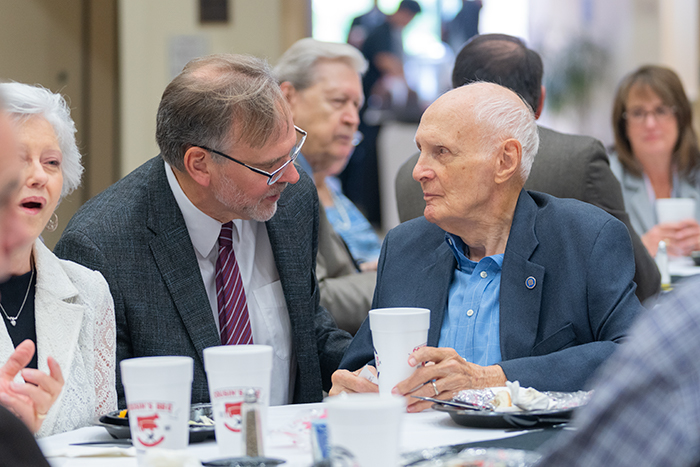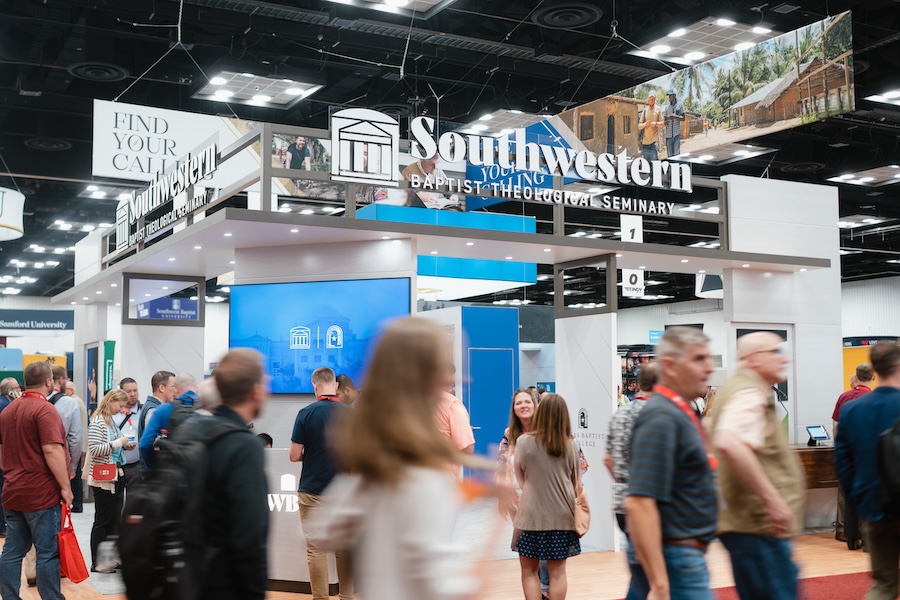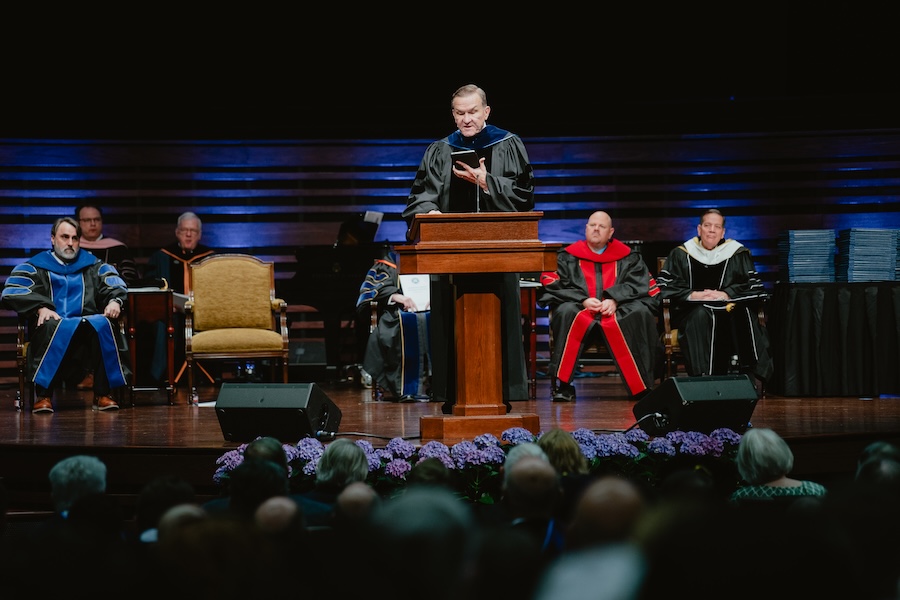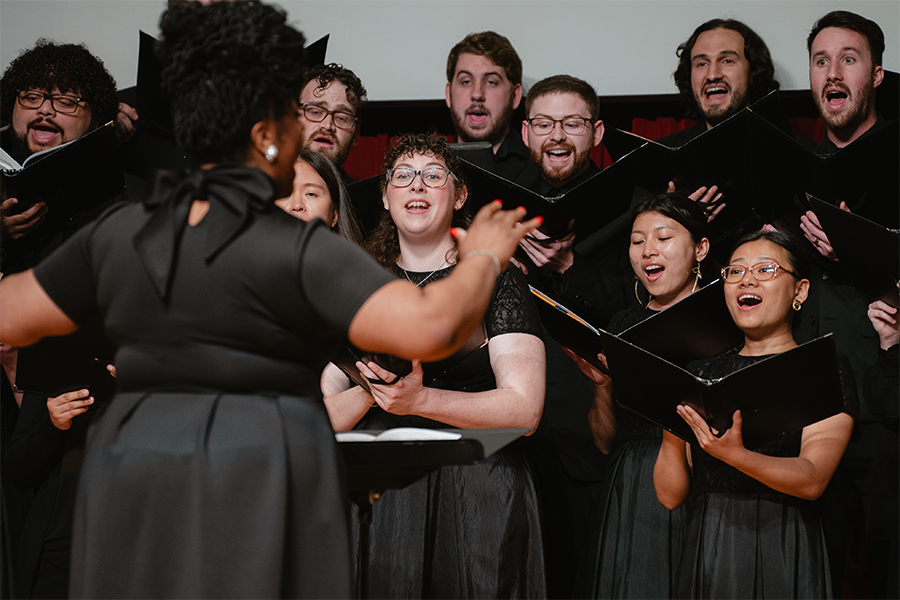Greenway thanks ‘legacy servants’ for faithful ministry

Since his election as president of Southwestern Baptist Theological Seminary last February, Adam W. Greenway has made efforts to reconnect with former faculty and staff—or, as he calls them, “legacy servants” of the seminary. In that vein, Sept. 5 was a day to which he looked forward for some time, for on that day, he welcomed back to the campus a number of legacy servants from Southwestern Seminary’s history.
That day, Al Fasol, distinguished professor of preaching emeritus, preached in chapel, and Greenway welcomed the Seniors of Southwestern—a fellowship of retired faculty and staff—as honored guests.
“As the first alumnus of our seminary to serve as president in a quarter-century, it’s very meaningful to me that all of our Southwestern family sense the love and the appreciation and the gratitude of our seminary for their service,” Greenway said while recognizing the seminary’s retired faculty in chapel. “Because candidly, all of us who currently serve here at Southwestern Seminary, we are living in houses we did not build; we are drinking from wells we did not dig.
“There is a line of faithfulness that goes back through the generations of the men and women who gave selflessly to help build Southwestern Seminary into the crown jewel that she is today.”
Speaking of the impact of these legacy servants, Greenway said, “There are people who have had a more faithful ministry because you followed God’s calling to serve here at Southwestern Seminary, when you could have done a lot of other things in a lot of other places. And that’s why it’s important for Southwestern Seminary to have this chance to say ‘thank you’ for what you’ve done. Our seminary is a better place because you have been here.”
Fasol, who began teaching at Southwestern Seminary in 1973, opened his sermon by sharing how pleased he was to “finally meet” the current students. He explained that, during orientation for new instructors back in 1973, he discussed with then-faculty members the cultural changes that would lead to difficult days for their children and grandchildren as Christians in the United States. One of those faculty members—Jack Gray, a professor of missions—said, “I think we’d better pray for those children and those grandchildren to come.”
“And we literally prayed for you 46 years ago,” Fasol said. “And we didn’t stop. Every semester—I’m sure it’s happening among the faculty even today—at the beginning of the year, we always prayed for the students—incoming, those who were here, those graduating, those recently graduated. There was always prayer for you going on.”
Based on this discussion 46 years ago, Fasol said there are at least two things modern-day Christians need in order to deal with the changes that have occurred in society. First, they need to have a strong foundation.
Reading 1 Peter 1:3-4, Fasol said that in order to build a strong foundation, Christians must begin by praising God.
“Historically, Christianity has prospered under challenges more than it has under prosperity,” Fasol said. “And as you anticipate those days, the first thing you do, no matter how difficult the circumstance is, is you praise God, the Father of our Lord Jesus Christ, who according to His mercy piled upon mercy, has caused us to be born again.”
The second thing modern-day Christians need, Fasol said, is all the elements found in 2 Timothy 1:7. He explained that Christians armed with confidence, power, love, and a sound mind will be able to act on their faith and give an answer to everyone who asks why they believe in Jesus.
“We are surrounded by a great cloud of witnesses here at Southwestern,” Fasol concluded. “… Understand that your present faculty prays for you. They are deeply educated, highly qualified, and called of God to be here to be your servant.
“The administration is called of God to be here to do everything they can to make sure that you don’t have to and the faculty doesn’t have to worry about anything else except why you are here: to study where God has brought you.”
“With all of these advantages,” Fasol said, “build your strong foundation, and be ready to give an answer to those who ask.”
A luncheon was held after chapel providing current faculty and staff the opportunity to converse with the former faculty and staff. Greenway said the scene of such conversations taking place represented a “beautiful sign of God’s Kingdom and our one Southwestern family.”
“We love you. We’re so thankful for you,” Greenway said to the legacy servants. “We could not tell the story of Southwestern Seminary apart from you.
“And know that any way that we can serve you, bless you, help you … that is our desire. We want you to feel loved and welcome and at home here at the dome. So please do not make this the last time that you are here with us.”



